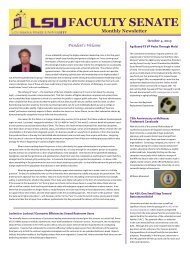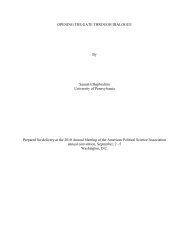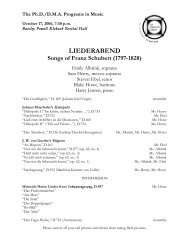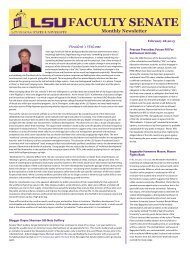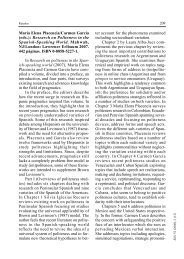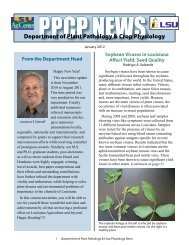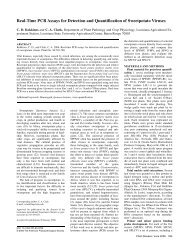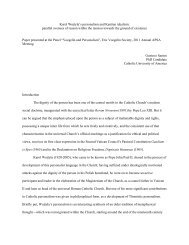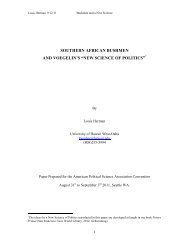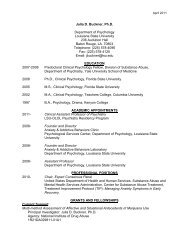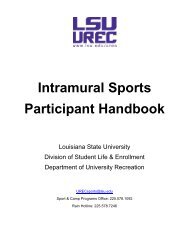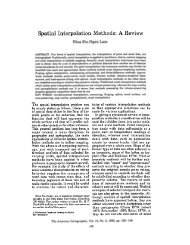Nicoletta Stradaioli, University of Perugia - Louisiana State University
Nicoletta Stradaioli, University of Perugia - Louisiana State University
Nicoletta Stradaioli, University of Perugia - Louisiana State University
Create successful ePaper yourself
Turn your PDF publications into a flip-book with our unique Google optimized e-Paper software.
function <strong>of</strong> knowing by experience (the knowing stream <strong>of</strong> consciousness within reality): to<br />
know and to be conscious <strong>of</strong> are integral parts <strong>of</strong> pure experience. In this context, common<br />
sense still represents reality in its direct view and it is the first form <strong>of</strong> truth, the first stage<br />
<strong>of</strong> philosophizing. Accordingly, at the basis <strong>of</strong> human well-being there is experience in its<br />
participatory nature and common sense: they both bind together the socio-political<br />
community.<br />
James’s philosophy «navigate[s] us across the sea <strong>of</strong> experience and get[s] us in<br />
touch with its farther reaches»; 15 as a matter <strong>of</strong> fact, according to Voegelin, James<br />
emphasizes the creative, participatory and dynamic role <strong>of</strong> experience capturing, on the one<br />
hand, the complexity <strong>of</strong> the world and, on the other hand, rejecting the dogmatic<br />
components <strong>of</strong> reality which through abstraction and conceptual constructions deform and<br />
eclipse reality. Thus, James’s study becomes <strong>of</strong> particular importance for Voegelin’s search<br />
for truth providing a fundamental insight into experience and the reality <strong>of</strong> consciousness. In<br />
particular, in the Voegelinian view, the stimulating effect lies in «the in-between character<br />
<strong>of</strong> experience»: experience is «neither in the subject nor in the world <strong>of</strong> objects» but «In-<br />
between <strong>of</strong> the divine and the human». These poles <strong>of</strong> experiential tension <strong>of</strong> the<br />
participatory pure experience make noetic differentiation possible, which implies the<br />
differentiation <strong>of</strong> society itself. 16<br />
Furthermore, according to Voegelin, society and its order depends on homonoia, in<br />
the Aristotelian and Christian sense, that is likeness in the participation in the common nous<br />
under the guidance <strong>of</strong> attraction toward transcendence. Homonoia (or likemindedness)<br />
reveals the substance <strong>of</strong> society and it is closely linked to common sense. Actually, common<br />
sense describes the common interest <strong>of</strong> the community, what is right and good for the<br />
communal life. In Thomas Reid terms, it is a concord, a trust and a sharing about what is<br />
required morally and practically to bind the community together. Hence, common sense is a<br />
kind <strong>of</strong> rational sociability which presupposes a mental disposition that is «an openness <strong>of</strong><br />
consciousness to all that the experience may show». 17 In Voegelin, the openness <strong>of</strong> common<br />
15<br />
S.P. SEGREST, America and the Political Philosophy <strong>of</strong> Common Sense cit., p. 161.<br />
16<br />
E. VOEGELIN, Autobiographical Reflections cit., pp. 98-99.<br />
17<br />
S.P. SEGREST, America and the Political Philosophy <strong>of</strong> Common Sense cit., p. 22.<br />
8



